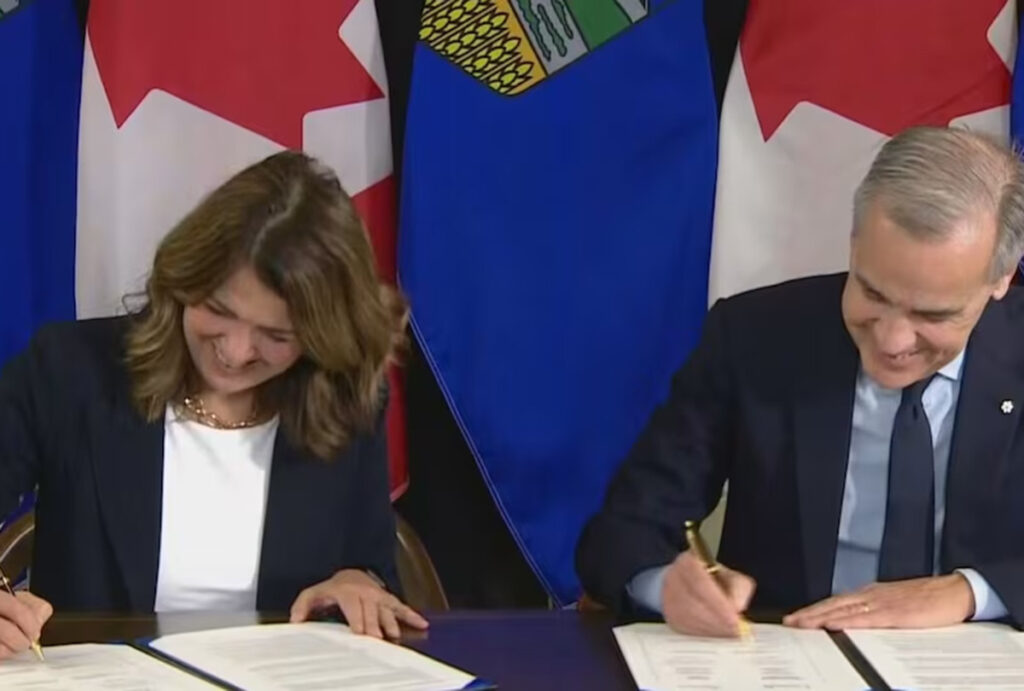
Prime Minister Mark Carney and Alberta Premier Danielle Smith have signed a major new energy co-operation agreement outlining the emission and other climate conditions that need to be met in order for the federal government to provide a “clear and efficient” process to approve a new oil pipeline to the Pacific under the federal major projects law.
Signing a new memorandum of understanding (MOU), the federal and provincial governments are committing to a series of measures aimed at strengthening co-operation on major infrastructure projects, increasing energy production, and improving the country’s economic sustainability and export potential.
Among the terms that would see the Canadian government help fast-track an Alberta pipeline, is the province signing on to an industrial carbon pricing agreement that would implement an industrial carbon price of $130 per tonne to lower methane emissions by 75 per cent over the next 10 years. In return, the federal Liberals have agreed to suspend the clean electricity regulations in the province and to not implement the oil and gas emissions cap.
At the signing ceremony in Calgary on Thursday, the prime minister called it “a great day” for Alberta, for Canada, and for co-operative federalism, explaining that while there’s more work to do this MOU “sets the stage for an industrial transformation.”
“At the core of the agreement, of course, is a priority to have a pipeline to Asia. That’s going to make Canada stronger, more independent, more resilient, more sustainable. Because the way we’re going to do that, is in combination with the Pathways project,” Carney said, speaking to the requirement for the Pathways Alliance carbon capture project to be developed in tandem, as one of the contingencies attached to approving a new pipeline.
Calling the MOU “a first step,” ahead of signing it, Smith said she was pleased that the prime minister heard her provinces’ concerns and that they could find a path forward together.
Tanker ban exemption possible
The new federal-provincial agreement marks a historic reset of relations between the two governments, but has the potential to complicate dynamics with another.
B.C. Premier David Eby has vehemently opposed the approval of a new oil pipeline to the west coast and has called it unacceptable that his province has been excluded from proposed pipeline talks.
The MOU notes the two governments have agreed to “engage” with British Columbia “to further the economic interests of B.C. related to their own projects of interest,” and involve B.C. First Nations, to ensure they share in the financial benefits, should the pipeline proceed.
Though, it also notes that if an Alberta bitumen pipeline does get approved by the Major Projects Office (MPO), the federal government will make any appropriate adjustments to the Oil Tanker Moratorium Act, essentially opening up an exemption to the federal tanker ban.
What projects are part of the pact?
According to senior provincial and federal officials who briefed reporters early Thursday, the MOU is underpinned by a shared commitment to achieve net zero greenhouse gas emissions by 2050 and create hundreds of thousands of high-paying jobs. The federal and provincial governments are also committing to consult and “where appropriate” accommodate Indigenous peoples and rights.
The MOU unveiled Thursday focuses on plans to advance four specific projects:
- Constructing “one or more” pipelines, financed by the private sector with Indigenous co-ownership, moving at least one million barrels a day of “low emission Alberta bitumen” on a route prioritizing Asian markets, in addition to Trans Mountain pipeline expansion;
- Constructing and financing Pathways, the world’s largest proposed carbon capture, utilization, and storage project – a piece of this deal framed as necessary and a prerequisite to offset emissions;
- Constructing thousands of megawatts of AI computing power, with a “large portion” dedicated to sovereign cloud; and
- Constructing large transmission interties with British Columbia and Saskatchewan to improve western provinces’ ability to supply low carbon power
“Alberta and Canada will work together to achieve the shared objective of establishing Canada as a global energy superpower, unlocking the growth potential of Western Canada’s oil and gas, renewable energy, critical minerals, and other resources that the world need,” reads the MOU.
“I don’t know that the prime minister would have agreed to a new bitumen pipeline without Pathways, and we wouldn’t have agreed to Pathways without a new bitumen pipeline,” Smith told reporters on Thursday, adding that she’s already met with the Pathways Alliance – five of Canada’s largest oil sands companies behind the proposal – about next steps.
Timelines for key submissions
The provincial and federal governments will be appointing an “implementation committee” to deliver on the measures within the MOU.
This includes putting in place, on or before April 1, 2026: a carbon pricing equivalency agreement; a methane equivalency agreement; a tri-lateral agreement with the Pathways companies; and a cooperation agreement on impact assessments.
Then, on or before July 1, 2026, the parties must come to an agreement determining how Alberta can submit its pipeline application to the MPO as the proponent, and the federal government must provide feedback on Alberta’s policy framework for AI data centres.
Lastly, by January 1, 2027, Alberta must finalize its nuclear power generation strategy.
Carney to speak to Calgary Chamber
Following the signing ceremony, Carney and Smith are holding related events throughout the day in Calgary.
Carney is meeting with unionized skilled trade workers, and later will deliver remarks and participate in a fireside chat hosted by the Calgary Chamber of Commerce.
That event is set to be attended by major players from both levels of government as well as energy sector stakeholders.
Share This:




 CDN NEWS |
CDN NEWS |  US NEWS
US NEWS 
























